FEBRUARY 2021
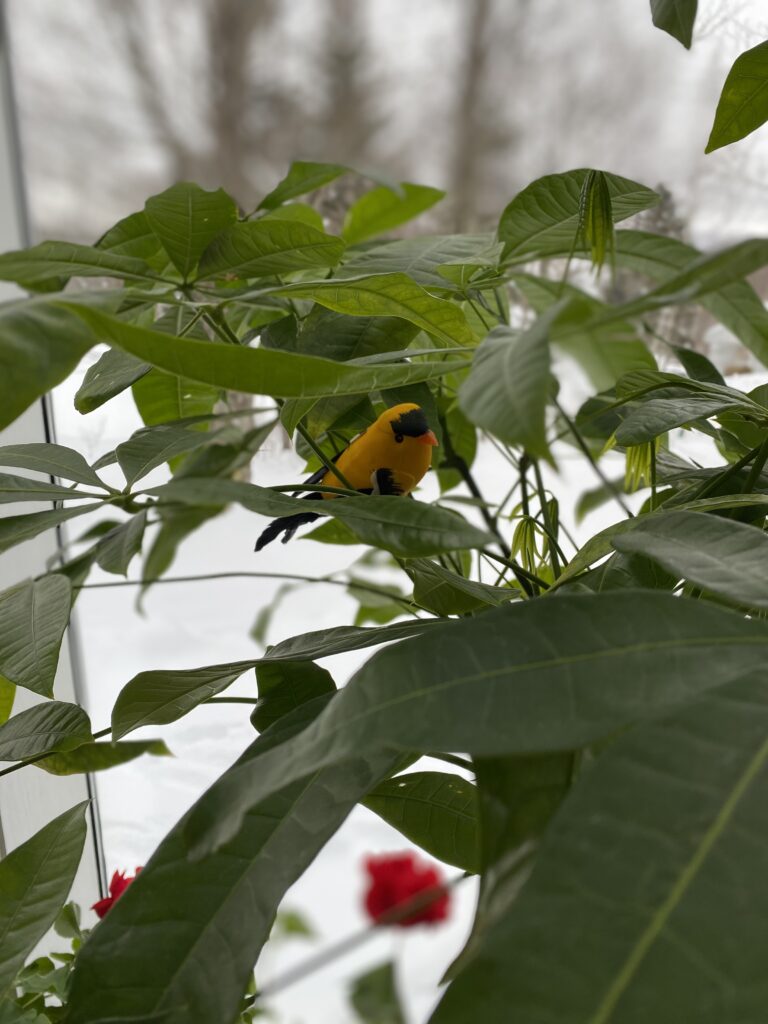 Navigating our Way from Winter to Spring. Ground Hog Day has come and gone and we are anticipating more winter. Well, so? Here in Vermont it would be disappointing to anticipate otherwise. Bleak? Yes, for the glass half-empty kind of outlook, February is bleak, cold, often gray and blessedly short. But for the glass half-full there are many prompts for celebration. Valentine hearts and flowers can’t be beat and the days are, albeit gradually, lengthening.
Navigating our Way from Winter to Spring. Ground Hog Day has come and gone and we are anticipating more winter. Well, so? Here in Vermont it would be disappointing to anticipate otherwise. Bleak? Yes, for the glass half-empty kind of outlook, February is bleak, cold, often gray and blessedly short. But for the glass half-full there are many prompts for celebration. Valentine hearts and flowers can’t be beat and the days are, albeit gradually, lengthening.
Think back to February 2020. We seemed to have been living in a different universe, one in which masks, distancing and an attack on the Nation’s Capital were unimaginable. Then came a Friday the 13th in March that will, presumably, long be remembered. (I know, we’ve thought that of other events but ….)
However, rather than go down that rabbit hole, let’s return to today. Hope and optimism might have been temporarily buried, but are starting to reappear along with signs of new life medically, socially and politically. There are even hopes that the vaccines now being administered will effectively dampen the fires of Covid19 and perhaps reduce them to cinders from which no new strains will be tempted to flare. We don’t think it will be soon, but we do think there will come a day when we can hug our friends and families and return to some semblance, or at least hybrid, of what life used to be. May we learn lessons from these months, and potentially years, of Covid that will enrich what lies ahead.
But returning to February … I recently read that babies born in February tend to exhibit traits of honesty and compassion coupled with creativity and curiosity. Often quirky, February kids can be feisty as well. Do they take after the month itself? Their personalities do, however, dovetail nicely with some reading I’ve been doing lately.
You may have heard on Fresh Air a few weeks ago the interview of Sanjay Gupta (promoting his new book, Keep Sharp). Being a February kid myself I was particularly attracted to his thoughts on a sound brain, aging and activity suggesting that both intellectual and physical curiosity and exploration are healthy and that seeking new things to study and do, pushing oneself outside the familiar, that personal comfort zone, help sustain both body and brain. And yes, the brain does continue to develop over the years. (I got so excited about this interview that I quickly bought the book to give as a birthday present to a family member much younger than me. Heads up, I just learned that it was written somehow in cooperation with AARP. I hope the recipient won’t think …. But don’t let that dissuade you from taking a look.)
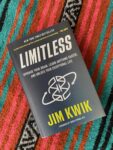 Almost immediately after the interview a friend gifted me with the book Limitless by Jim Kwik asking that we experience this book together. (bless FaceTime) Kwik, too, encourages positivity, optimism, and action proving that we can indeed live limitlessly. (Is that a word? If not, it should be!) “The key to making yourself limitless is unlearning false assumptions,” Kwik writes. Both Gupta and Kwik begin with the brain but quickly connect with body, motivation, values, and the tools of learning, fitness, nutrition, sleep and the entire half-full concept. Clearly, motivation is a key component and Kwik advises that “Motivation is not something you have, it’s something you do. And it’s entirely sustainable.”
Almost immediately after the interview a friend gifted me with the book Limitless by Jim Kwik asking that we experience this book together. (bless FaceTime) Kwik, too, encourages positivity, optimism, and action proving that we can indeed live limitlessly. (Is that a word? If not, it should be!) “The key to making yourself limitless is unlearning false assumptions,” Kwik writes. Both Gupta and Kwik begin with the brain but quickly connect with body, motivation, values, and the tools of learning, fitness, nutrition, sleep and the entire half-full concept. Clearly, motivation is a key component and Kwik advises that “Motivation is not something you have, it’s something you do. And it’s entirely sustainable.”
In the fitness world we know that we are unique individuals who have the ability to define ourselves and our possibilities based on what we’ve been given to work with. Sometimes, however, our talents are hidden or underappreciated. Recognizing creativity, willingness, energy, dedication and compassion may result in their use to turn possibilities into probabilities and energy into strength, competence and confidence.
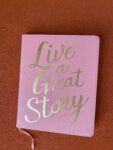
For some, a return to pen and paper is helpful to learn and to effect positive change.
Kwik writes many paragraphs on ‘learning,’ giving it the credence and respect due. It is not news that roles of student and teacher are closely connected and that one enhances the other. As we learn, and as we embrace the wonder and delight that learning offers, we deepen our understanding and absorb the fullness of whatever it is when we in turn share it with others or turn our studies into teachings.
Somewhat on the flip side of all this positivity, I also read an article entitled Anxiety Fallout in the winter edition of the Johns Hopkins Magazine. Being an Alum, I tend to give weight to what I read in these pages. Few would argue with the current and growing crisis of mental health. Anxiety has become a household term yet the definition is fluid – anything from normal to devastating and even deadly. 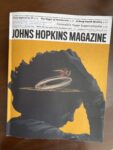 An element of anxiety that strikes a chord with me is what the author, Aaron Reuben, calls ruminating. “When you find yourself talking about the same problem over and over again, without finding you’ve made any progress on it, that’s when you can tell it’s rumination….Too often we get stuck in defining problems when we need to move on to problem-solving.” I recall thinking that when my mother was aging and living alone, what she told herself must have been a loop of negativity and her perception of reality looked quite different from what my brother and I saw. She obsessed. Just last night I was reading Kwik’s Limitless and underscored a quote by Melanie Greenberg, “Anxiety can also lead to overthinking, which makes you more anxious, which leads to more overthinking, and so on.” I wrote in the margins – “STOP obsessing!” (Interestingly this was embedded in a chapter on Focus and the value of effective concentration. Kwik counsels: “Your concentration is like a muscle. You can train to become stronger with practice.” Yeah, well, I get that analogy!)
An element of anxiety that strikes a chord with me is what the author, Aaron Reuben, calls ruminating. “When you find yourself talking about the same problem over and over again, without finding you’ve made any progress on it, that’s when you can tell it’s rumination….Too often we get stuck in defining problems when we need to move on to problem-solving.” I recall thinking that when my mother was aging and living alone, what she told herself must have been a loop of negativity and her perception of reality looked quite different from what my brother and I saw. She obsessed. Just last night I was reading Kwik’s Limitless and underscored a quote by Melanie Greenberg, “Anxiety can also lead to overthinking, which makes you more anxious, which leads to more overthinking, and so on.” I wrote in the margins – “STOP obsessing!” (Interestingly this was embedded in a chapter on Focus and the value of effective concentration. Kwik counsels: “Your concentration is like a muscle. You can train to become stronger with practice.” Yeah, well, I get that analogy!)
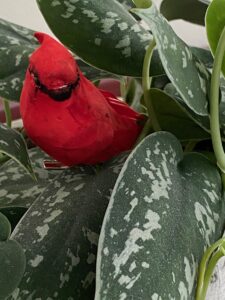 So, back to February. As I write this, it is Valentine’s Day. I am a sucker for what I know is a Hallmark day but so what? I really do love the hearts and flowers stuff and get even more sappy on this day of all days. I DO know we are in a pandemic; our country is hanging on, it is winter where I live, and there’s a laundry list of suffering that I am blessed not to experience but have infinite sympathy for those who do. I recognize the enormity of personal responsibility for our brains and our emotions linked with the sense of helplessness when that which we have no control over descends. I dig deep inside myself for tolerance, compassion, hope and faith. And today of all days, love.
So, back to February. As I write this, it is Valentine’s Day. I am a sucker for what I know is a Hallmark day but so what? I really do love the hearts and flowers stuff and get even more sappy on this day of all days. I DO know we are in a pandemic; our country is hanging on, it is winter where I live, and there’s a laundry list of suffering that I am blessed not to experience but have infinite sympathy for those who do. I recognize the enormity of personal responsibility for our brains and our emotions linked with the sense of helplessness when that which we have no control over descends. I dig deep inside myself for tolerance, compassion, hope and faith. And today of all days, love.
I often close a Yoga practice with these words: Honor your heart. Not only is your heart one of the most important muscles in your body, a source of life itself, but it also represents your ability to love and TO BE loved. Namaste.
